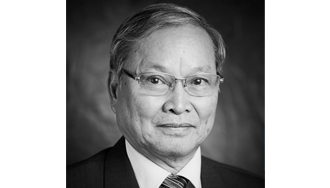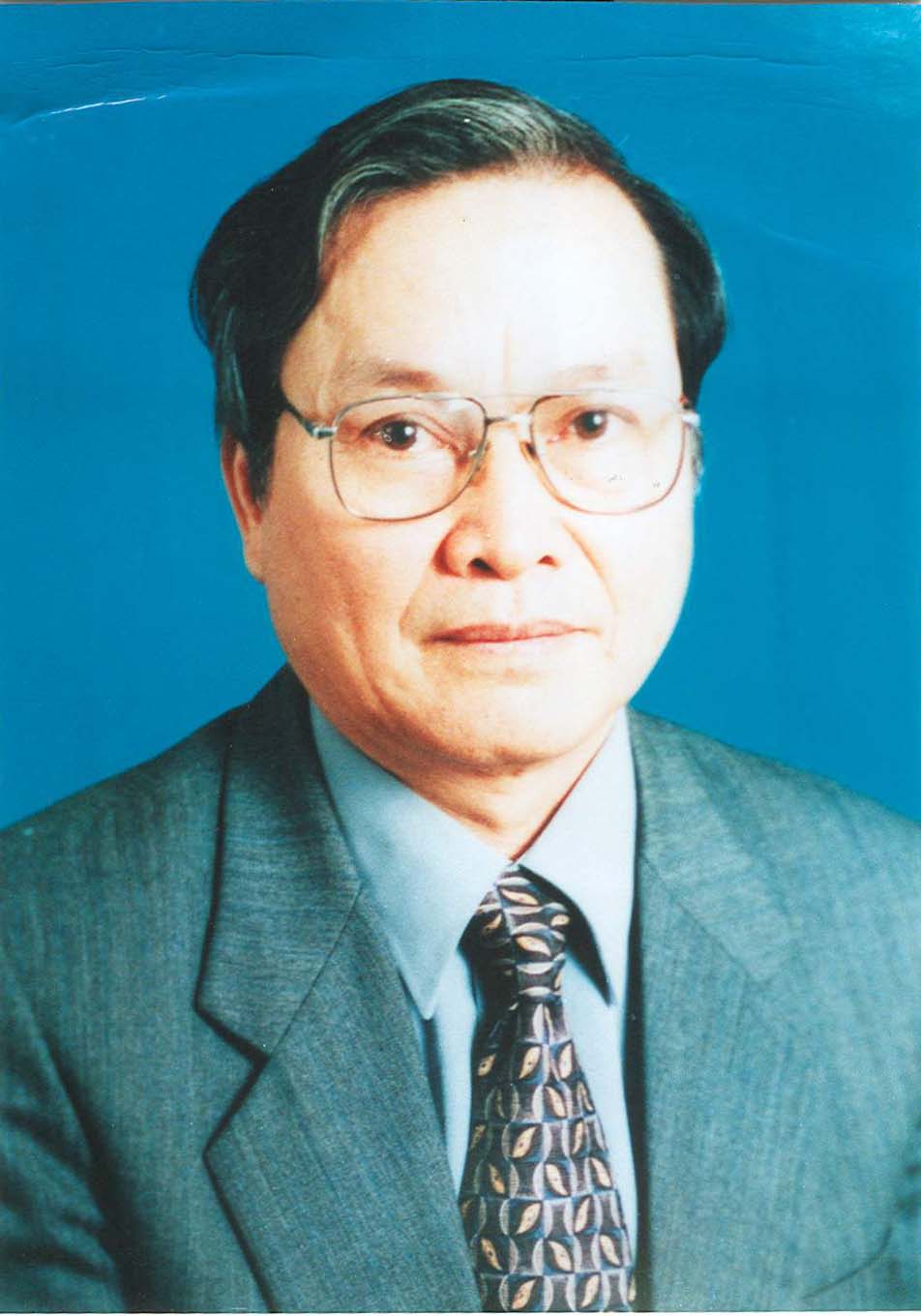
Professor Dr. Le Quang Thiem's linguistic research career focuses on three main areas: Comparative linguistics; Research on the history of vocabulary development and semantic development of the Vietnamese language; and Semantics research.
Comparative linguistics has been present in linguistics for a long time. Comparative linguistics has become a thriving subfield in modern linguistics, as it meets the demands of linguistic theory in a new era, while simultaneously allowing linguistic knowledge to be applied in broad, practical ways. This work...Comparative studies of languagesProfessor Le Quang Thiem's book (first published in 1989 by the University and Vocational High School Publishing House) is the first comprehensive and in-depth study of comparative linguistics. The book systematically introduces general knowledge, common understanding of the history of research, and theoretical premises of comparative linguistics as an independent scientific subfield. It also conducts comparative studies of several aspects of language levels: comparative studies of vowels, consonants, syllables, and intonation phenomena in Vietnamese and English; comparative studies of morphemes in terms of structure and function; comparative studies of sentences in terms of sentence structure, sentence components, interrogative and negative sentences in Vietnamese and English; and comparative studies of word and semantic levels, focusing on homonymy, polysemy, and semantic similarities in languages.
Based on a deep understanding of general linguistics and incorporating the achievements of comparative linguistics worldwide, Professor Le Quang Thiem has effectively applied this knowledge to the study of specific issues in comparative linguistics. Therefore, the research content in this book is up-to-date and keeps pace with scientific information on comparative linguistics globally, allowing for creative and effective application to the study of specific issues of the Vietnamese language in comparison with other languages. This work has laid the foundation for the field of comparative linguistics in Vietnam, and Professor Le Quang Thiem has become a leading expert in the field of comparative linguistic research.

Professor, Doctor, People's Teacher Le Quang Thiem.
He was the Head of the Faculty of Literature (1985-1987); Secretary of the Party Committee of Hanoi University (1988-1990); Vice Rector of Hanoi University (1988-1992); and President of the Vietnam Linguistics Association (2006-present).
The Vietnamese semantic vocabulary is a vast, extremely complex system with a very long history. This book...History of Vietnamese vocabulary during the period 1858 - 1945Compiled by Professor Le Quang Thiem, this is the first comprehensive and fundamental study of Vietnamese linguistics on the development of Vietnamese vocabulary between 1858 and 1945, a particularly significant period in Vietnamese history from the French invasion of Vietnam to the successful August Revolution of 1945. This historical period has had a particularly strong influence and reflection on the Vietnamese vocabulary system. Professor Le Quang Thiem has delved into describing and analyzing the entire appearance and development of the Vietnamese language on the lexical-semantic level through a rich and diverse system of data considered at both synchronic and diachronic levels. The study of the history of Vietnamese vocabulary over this nearly 100-year period is described and analyzed by Professor Le Quang Thiem through linguistic events in contrast between monistic synchronicism and dynamic synchronicism. This approach is both scientific and skillful: with a complex subject, with so many interrelated dimensions and influencing factors like the lexical-semantic system, choosing one dimension, one aspect within that system to examine, analyze, and study through specific linguistic data and events has made this work highly valuable both theoretically and practically. The examination of vocabulary history through a series of events has contributed significantly to the work's value.
As a standalone structure,The development of Vietnamese vocabulary meaning from 1945 to 2005Compiled by Professor Dr. Le Quang Thiem (Vietnam National University, Hanoi, 2015), this book, while extending the study of the history of Vietnamese vocabulary, delves deeper into the semantic field of Vietnamese vocabulary. Starting from a synchronic perspective, the development of the Vietnamese semantic system over the past 60 years is examined, researched, and analyzed as a dynamic system formed "through functional activity." It is examined both at the macro level, generalizing to the entire Vietnamese semantic system, and at the micro level, from intellectual meaning to practical meaning and symbolic meaning. Studying the development of Vietnamese semantic meaning within a dynamic mechanism, Professor Le Quang Thiem has broken down the general semantic system into subsystems with basic units at different levels, from high to low, within various semantic fields. Thanks to this, the problem of word semantics, a problem that is inherently abstract and complex, has been addressed by Professor Thiem. Le Quang Thiem's work is more specific, clearer, and especially more profound and logical. His descriptions and analyses of word meanings encompass a broad period while also being meticulous and insightful in his studies of the transformation of practical semantic fields after 1945; his research into the characteristics of intellectual semantic fields through specific descriptions and analyses of semantic development in several scientific terminology systems—these are very new and unique research results of Professor Le Quang Thiem on the development of Vietnamese vocabulary meaning over the past 60 years. The uniqueness and novelty in Professor Le Quang Thiem's research on the semantic aspects of lexical units stem from a dynamic approach to meaning research, but more importantly, from a shift in theoretical direction and perspective on the conceptual content of semantic systems. The meaning of a word is one of the most important issues in linguistics; therefore, there are two different interpretive approaches surrounding this issue: a. Considering word meaning as a certain entity; b. Meaning is considered a certain relationship. As the expressed aspect (content aspect) of a linguistic signal, meaning is considered by Professor Le Quang Thiem to be an abstract spiritual entity existing in all expressions and levels of language, enabling language to perform its functions as a tool for communication and thought, as well as all other diverse specific functions, especially in speech, texts, and discourse: "Meaning is a spiritual entity, that is, a form constructed by and used by humans. Language is used as a means, a tool, so the functional perspective must be considered the central core of meaning interpretation." As a product of human thought activity, in Professor Le Quang Thiem's view, meaning is always linked to the process of human cognition. The formation of word meaning plays a crucial role in human cognitive activity. Speaking of meaning means speaking of knowledge, understanding, and the perceived content that reflects the world in human perception, expressed through linguistic symbols in the world of language. Therefore, the semantic aspect also reflects, through vocabulary, the cultural and spiritual characteristics of the nation using the language.
The dynamic perspective on semantic research, the shift in theoretical direction, and the change in viewpoint on the conceptual content system of meaning, as described above, have been clearly presented by Professor Le Quang Thiem in his work.Semantics(Published as a book in 2008, Education Publishing House). This scientific work marked a new development, a new approach, and a new perspective in the study of semantics in general and the semantics of Vietnamese vocabulary in particular.
These two projects aloneHistory of Vietnamese vocabulary during the period 1858 - 1945andThe development of Vietnamese vocabulary meaning from 1945 to 2005Professor Le Quang Thiem completed a historical survey of Vietnamese vocabulary and semantics spanning nearly 150 years (from 1858 to 2005) using an unprecedentedly large corpus in the history of Vietnamese language development. This work marked a milestone in the study of Vietnamese language history. These two scholarly works by Professor Le Quang Thiem are exemplary in their approach to research, encompassing both breadth and depth, the exploitation of data, and problem-solving to achieve comprehensive and profound research results on a complex and diverse subject – the history of modern Vietnamese vocabulary and semantics.
As one of Professor Le Quang Thiem's first students, we knew him from the 1970s, when we were students of the 14th cohort (1969-1973) in the Faculty of Literature, Hanoi University. At that time, he was our head of the Linguistics class. Although young, he had a very dignified demeanor and was particularly strict. Nearly half a century has passed since then, and Professor Le Quang Thiem has trained countless generations of undergraduates, graduate students, and doctoral candidates in Linguistics both domestically and internationally. Having received a very thorough education abroad and possessing extensive knowledge in comparative linguistics, vocabulary, and semantics, his lectures and specialized courses have provided students with a deep and comprehensive system of knowledge. Many graduate students and doctoral candidates have successfully defended their master's theses and doctoral dissertations on vocabulary, semantics, and comparative linguistics under the systematic and scientific guidance of Professor Le Quang Thiem, a highly knowledgeable teacher in his field and a role model in pedagogy. Many generations of his students have graduated and become successful in the fields of linguistic research and teaching. He has imparted his professional knowledge to them, taught them the art of living, and how to conduct themselves in life.
I would also like to add that there is a subject area, a field of knowledge that suits the professor's style, which is culture. Unfortunately, I haven't had the opportunity to read it thoroughly and systematically, so I can't record my detailed understanding here. I've noticed that wherever and whenever he studies linguistics, he seems to be interested in understanding culture. His works always show a connection and attention to culture within and with language.World Cultural DecadeLaunched by the United Nations (1987-1996), he, along with several veteran professors: Tran Dinh Huou, Nguyen Kim Dinh, and Thanh Duy, published the bookCulture and the development of Vietnamese society under the socialist orientation.(National Political Publishing House, 1998) edited by him. When he returned from his time as a visiting professor at Paris VII and his several-month research trip at the invitation of the Korea Foundation in Seoul, Korea, he published this book.Korean culture, civilization, and traditional cultural elements.(Literature Publishing House, 1998, reprinted 2005, Hanoi National University Publishing House). He also edited the bookThe Bru - Van Kieu ethnic group: current situation and solutions for sustainable development.(Agricultural Publishing House, 1997); and also co-authored the book.Cultural personality in the Vietnamese value system(Social Sciences Publishing House, 1993)Truth, goodness, and beauty - Unity and diversity in culture and art.(Social Sciences Publishing House, 1994),...
For generations of students, he will forever be a shining example of tireless work ethic and scientific creativity, and of the compassion of a teacher. It was he who instilled in many generations of students the passion and enthusiasm for scientific research, the love for humanity, and the love for their country.
|
PROFESSOR, DOCTOR, PEOPLE'S TEACHER LE QUANG THIEM
+ Workplace: Faculty of Literature, Hanoi University (1966-1988). Asia-Pacific Center, University of Social Sciences and Humanities (1994-1997). Department of Oriental Studies, University of Social Sciences and Humanities (1997-2005). Department of Linguistics, University of Social Sciences and Humanities (2005-2010). + Management position: Deputy Head of the Faculty of Literature (1984-1985). Head of the Department of Literature (1985-1987). Secretary of the Party Committee of Hanoi University (1988-1990). Vice Rector of Hanoi University (1988-1992). Head of the Department of Korean Studies (Faculty of Oriental Studies) (1997-2005). Head of the Department of Comparative Linguistics (Faculty of Linguistics) (1996-2010). President of the Vietnam Linguistics Association (2006-present).
Comparative studies of languages, 1989, University and Vocational High School Publishing House, reprinted by Vietnam National University Publishing House, Hanoi, 2004. History of Vietnamese vocabulary 1858-1945, Social Sciences Publishing House, Hanoi, 2003. The development of Vietnamese vocabulary semantics from 1945 to 2005, National University Publishing House, Hanoi, 2014. Semantics, Education Publishing House, Hanoi, 2008. The concepts of Korean civilization and traditional culture., National University Publishing House, Hanoi, 2006. |
Author:Assoc. Prof. Dr. Ha Quang Nang